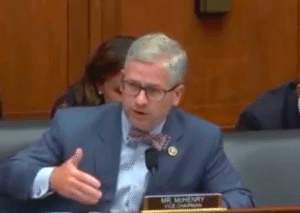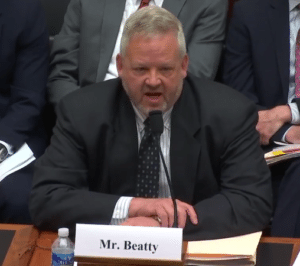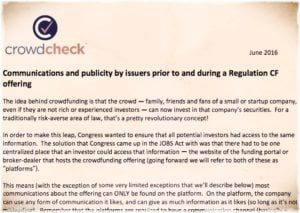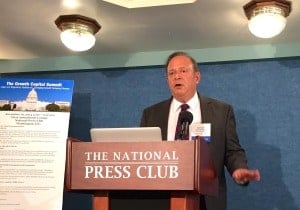
When it comes to capital formation for SME’s through federal legislation, one can usually count on the North American Securities Administrators Association (NASAA) to do their best to block or narrow any new paths which Congress or the SEC may seek to create. The JOBS Act and its implementation have been no exception to this rule.
 We were reminded of this very recently, when the District of Columbia Court of Appeals denied NASAA’s challenge to the SEC’s Regulation A+ rules, which broadly preempted the authority of the states to regulate SEC reviewed Regulation A+ offerings, even where unaccredited and unsophisticated investors are involved.
We were reminded of this very recently, when the District of Columbia Court of Appeals denied NASAA’s challenge to the SEC’s Regulation A+ rules, which broadly preempted the authority of the states to regulate SEC reviewed Regulation A+ offerings, even where unaccredited and unsophisticated investors are involved.
So too with JOBS Act Title III crowdfunding. No sooner had the ink dried on Congressman Patrick McHenry’s “Fix Crowdfunding Act” introduced into the House of Representatives in March 2016, former NASAA President and current Chair of the NASAA’s Committee on Small Business Capital Formation, testified before the House Financial Services Committee, urging lawmakers to do nothing to fix Title III crowdfunding – at least not  until there was more data to show how Title III was broken – and how it should be fixed. Even seemingly benign proposed fixes allowing an issuer to “test the waters” before formally conducting a Regulation CF offering were singled out by NASAA for deferral to some future, unspecified date. (My rebuttal to Mr. Beatty appears in an article published in Crowdfund Insider earlier this month).
until there was more data to show how Title III was broken – and how it should be fixed. Even seemingly benign proposed fixes allowing an issuer to “test the waters” before formally conducting a Regulation CF offering were singled out by NASAA for deferral to some future, unspecified date. (My rebuttal to Mr. Beatty appears in an article published in Crowdfund Insider earlier this month).
Not surprisingly, this was the same Bill Beatty, who urged this same Committee, back in September 2012, to condone disregard by the SEC of rulemaking deadlines dictated by the then five months old JOBS Act and defer consideration of all post-JOBS Act legislative reforms, urging the that the SEC conduct no JOBS Act rulemaking activities until the SEC had promulgated more than 100 rules under the Dodd-Frank Act of 2011 – a multi-year task.
 In Mr. Beatty’s words:
In Mr. Beatty’s words:
“Moreover, we note that many of the rulemakings required by the Dodd-Frank Act are long overdue. We have encouraged the SEC to prioritize its investor-protection rules ahead of the exemptions in the JOBS Act, and we urge Congress not to pressure the SEC to act hastily, especially where ill-considered changes could have a devastating impact on the delicate balance between investors and industry.”
And to give new meaning to the word “hubris”, Mr. Beatty’s formal 2012 remarks to this Congressional Committee were entitled: “THE JOBS ACT: IMPORTANCE OF PROMPT IMPLEMENTATION FOR ENTREPRENEURS, CAPITAL FORMATION, AND JOB CREATION”. Well, I guess the word “prompt” is susceptible to varying interpretations? You, the crowd, can be the arbiter of this one.
So much for NASAA being a worthy advocate for entrepreneurs, capital formation or job creation, at least where federal legislation and rulemaking removes power from state securities administrators.
Well, despite the continuing protestations of NASAA, history may be repeating itself – albeit in unexpected ways. It seems that once again, as the Commission has done with Regulation A+, the SEC has found an elegant workaround for at least one of the problems that most people, until recently, have viewed as plaguing effective implementation of Title III crowdfunding – the perceived limited ability of a Title III issuer to conduct “off portal” solicitation and advertising during the course of its Regulation CF raise.
You see, with Title III investments being the riskiest class – and being peddled to the most unsophisticated and vulnerable class of investors – Congress provided robust investor protections, including, mandatory disclosures, “bad actor” checks, limitations on investment amounts, and limitations on off-portal advertising. And central to this protective scheme was the tenet that all Title III transactions were to be conducted on and through a statutory “gatekeeper”: an SEC and FINRA registered “intermediary,” either a broker-dealer or a registered “funding portal.”
 Most of us, including yours truly, had drank the Kool-Aid, assuming that during a Regulation CF offering an issuer could conduct no off portal solicitation or advertising of its offering – with one very narrow exception – courtesy of SEC rulemaking: Rule 204, which though generally prohibiting an issuer from advertising the “terms of the offering,” allows an issuer to advertise the “terms of the offering” pursuant to a brief notice,” (dubbed by many a “tombstone ad”) containing no more than specified, very limited factual information about an issuer, including a “brief” description of the business and the “terms of the offering” (as defined in the Rule), coupled with a link to the intermediary hosting the raise. So long as you follow this rule, to the letter, you may circulate this very limited information about your offering off portal – but no more. If you violate this rule – by mentioning a term of the offering, and including with it information outside the scope of Rule 204, you may have blown your exemption from registration under applicable securities laws.
Most of us, including yours truly, had drank the Kool-Aid, assuming that during a Regulation CF offering an issuer could conduct no off portal solicitation or advertising of its offering – with one very narrow exception – courtesy of SEC rulemaking: Rule 204, which though generally prohibiting an issuer from advertising the “terms of the offering,” allows an issuer to advertise the “terms of the offering” pursuant to a brief notice,” (dubbed by many a “tombstone ad”) containing no more than specified, very limited factual information about an issuer, including a “brief” description of the business and the “terms of the offering” (as defined in the Rule), coupled with a link to the intermediary hosting the raise. So long as you follow this rule, to the letter, you may circulate this very limited information about your offering off portal – but no more. If you violate this rule – by mentioning a term of the offering, and including with it information outside the scope of Rule 204, you may have blown your exemption from registration under applicable securities laws.
But Then The Memo Came
 I recently received a copy of a publicly available memorandum prepared by CrowdCheck this month, entitled: “Communications and publicity by issuers prior to a Regulation CF offering.” It seems that CrowdCheck had recently engaged with the Staff at the SEC to flesh out the contours of what exactly an issuer could and could not do prior to and during a Regulation CF offering when it came to off portal communications. Regarding pre-filing publicity, there is nothing new there from the perspective of a seasoned securities lawyer, a subject I covered in an article back in March. But one of the conclusions that the memorandum reaches regarding issuer publicity during its Regulation CF offering is STUNNING!
I recently received a copy of a publicly available memorandum prepared by CrowdCheck this month, entitled: “Communications and publicity by issuers prior to a Regulation CF offering.” It seems that CrowdCheck had recently engaged with the Staff at the SEC to flesh out the contours of what exactly an issuer could and could not do prior to and during a Regulation CF offering when it came to off portal communications. Regarding pre-filing publicity, there is nothing new there from the perspective of a seasoned securities lawyer, a subject I covered in an article back in March. But one of the conclusions that the memorandum reaches regarding issuer publicity during its Regulation CF offering is STUNNING!
Yes, an issuer conducting a Regulation CF offering is free to not only continue normal business promotional activities off portal, but also to advertise and generate interest in its offering off portal, with one important caveat: these materials may not mention any of the “terms of the offering” – as defined in SEC Rule 204. However, these materials may directly link to the issuer’s offering page on the licensed intermediary.
So, for example, an issuer who has filed its Form C with the SEC and its intermediary, it is free to wax eloquently (but truthfully), off portal, regarding its business and prospects – via social media, webinars, live events, etcetera, so long as it does not mention or refer to the “terms of the offering” – as defined by Rule 204. Rule 204 defines “terms of the offering” as “the amount of securities offered, the nature of the securities, the price of the securities and the closing date of the offering period. So if you stay away from these areas, as an issuer you have fairly free reign to promote your company and your offering off portal.
 This would allow an issuer, for example to tack onto its promotional materials an “Invest Now” button, or similar verbiage, linking to the host intermediary, so long as the material does not mention the type of securities offered or otherwise contain a “term of the offering.” However, if your Invest Now button says “Invest Now in our Common Stock” or “Invest Now before the offering closes on July 31, 2016,” you will likely have violated Regulation CF since you have included a “term of the offering” with information going beyond the type of information permitted in a Rule 204 notice.
This would allow an issuer, for example to tack onto its promotional materials an “Invest Now” button, or similar verbiage, linking to the host intermediary, so long as the material does not mention the type of securities offered or otherwise contain a “term of the offering.” However, if your Invest Now button says “Invest Now in our Common Stock” or “Invest Now before the offering closes on July 31, 2016,” you will likely have violated Regulation CF since you have included a “term of the offering” with information going beyond the type of information permitted in a Rule 204 notice.
Compliance can be a bit tricky for the lay person, but for the well-counseled issuer, there is a great deal of utility in what one (myself included) might characterize as an unintended “loophole” in Title III – at least when it comes to generating public awareness in your company and your offering through social media and the internet outside the confines of a single intermediary.
So how, exactly, did this “loophole” come about?
It seems that the JOBS Act only requires that specified crowdfunding “transactions” take place on a licensed intermediary. But Title III is silent on the ability of an issuer to engage in general solicitation and advertising off portal, with one narrow exception. Title III, does in fact, restrict advertising by an issuer of its Title III offering. But the statutory ban on advertising only extends to advertising the “terms of the offering.” Anything else is good to go under Title III unless the SEC promulgates additional restrictions through the rulemaking process – which it certainly has the discretion to do – but seemingly has not.
A close look at the final SEC Title III rules confirms that there are no additional restrictions by an issuer on off portal advertising or offering activity. In fact, by reason of the SEC narrowly defining “terms of the offering” in Rule 204, all else is fair game off portal for an issuer’s offering and PR activity during the Regulation CF raise.
 Frankly, from my perspective, this was too important an issue to rely solely upon the CrowdCheck memo, or even my own “legal” analysis. Surely I must be missing something in my analysis. So last week I hopped on the Amtrak train from NYC to DC to say hi to the Staff at the SEC – coupled with a simple request: to point out the flaws in my analysis as to the permissible scope of off-portal offering activities under Regulation CF. Well, it seems that there weren’t any holes in my simple, stupid statutory and regulatory analysis.
Frankly, from my perspective, this was too important an issue to rely solely upon the CrowdCheck memo, or even my own “legal” analysis. Surely I must be missing something in my analysis. So last week I hopped on the Amtrak train from NYC to DC to say hi to the Staff at the SEC – coupled with a simple request: to point out the flaws in my analysis as to the permissible scope of off-portal offering activities under Regulation CF. Well, it seems that there weren’t any holes in my simple, stupid statutory and regulatory analysis.
As I headed back to NYC, I couldn’t help but ponder how this could have happened. After all, wasn’t Title III, as “butchered” by NASAA and other lobbyists in the Senate before being passed into law, touted as an offering activity neatly compartmentalized and confined to the Title III licensed registered intermediary? And surely, this statutory “loophole” could not have gone unnoticed by the Commission and the Staff during the rulemaking process – though seemingly unnoticed by virtually all other market participants.
Yes, this in my opinion is the same type of elegant (and lawful) creativity which the Commission and the Staff exhibited in proposing and implementing Regulation A+ – in the interest of making the JOBS Act mandate work as well as possible in practice – pre-empting the authority of the states to regulate Regulation A+ offerings to accredited and unaccredited investors alike.
Lessons to be Learned
Legislative sausage making often results in legislation with unintended or unforeseen consequences. Sometimes trapped in the sausage casing are microscopic pockets of air – which go unnoticed in the legislative process – only to surface months or years later. Well, it seems that once again the SEC found some oxygen for Title III crowdfunding in one of these “pockets” – as it did in Regulation A+ rulemaking – a pocket not clearly evident from the text of the legislation – or even from a close read of the final Regulation Crowdfunding rules themselves.
 So perhaps the time has come for NASAA to rethink some of its PR strategy, in particular the constant, familiar harangue by NASAA and some state securities administrators during the Regulation A+ rulemaking process – that after all, the state securities administrators know better than the SEC when it comes to reviewing offerings in their state. Perhaps, just perhaps . . . There might be some backlash when you repeatedly tell Congress, the public and the SEC that you know better than the SEC – and even members of Congress – especially when you are on the wrong side of an issue – and are standing in the way of the inevitable changes for the better that are taking place in our financial markets, big and small.
So perhaps the time has come for NASAA to rethink some of its PR strategy, in particular the constant, familiar harangue by NASAA and some state securities administrators during the Regulation A+ rulemaking process – that after all, the state securities administrators know better than the SEC when it comes to reviewing offerings in their state. Perhaps, just perhaps . . . There might be some backlash when you repeatedly tell Congress, the public and the SEC that you know better than the SEC – and even members of Congress – especially when you are on the wrong side of an issue – and are standing in the way of the inevitable changes for the better that are taking place in our financial markets, big and small.
 To be clear, these are my views, and my views alone. They do not necessarily reflect the view of anyone else, including CrowdCheck or the SEC. And they should not be construed as legal advice. Nonetheless, we all owe a debt of gratitude to the folks at the SEC for their hard work on Title III – and to Sara Hanks/CrowdCheck for ferreting out one of the best-kept secrets thus far in Title III crowdfunding.
To be clear, these are my views, and my views alone. They do not necessarily reflect the view of anyone else, including CrowdCheck or the SEC. And they should not be construed as legal advice. Nonetheless, we all owe a debt of gratitude to the folks at the SEC for their hard work on Title III – and to Sara Hanks/CrowdCheck for ferreting out one of the best-kept secrets thus far in Title III crowdfunding.
Having said that, it seems that Title III issuers now have a new tool in their arsenal to draw attention to both their company and their offering off portal, in a meaningful way, during their Regulation CF offering without running afoul of securities laws.
 Samuel S. Guzik, a Senior Contributor to Crowdfund Insider, is a corporate and securities attorney and business advisor with the law firm of Guzik & Associates, with more than 30 years of experience in private practice. Guzik is also former President and Board Chair of the Crowdfunding Professional Association (CfPA) and currently CfPA Legislative & Regulatory Special Counsel. A nationally recognized authority on the JOBS Act, including Regulation D private placements, investment crowdfunding and Regulation A+, he is and an advisor to legislators, researchers and private businesses, including crowdfunding issuers, service providers and platforms, on matters relating to the JOBS Act. As an advocate for small and medium sized business, he has engaged with major stakeholders in the ongoing post-JOBS Act reform, including legislators, industry advocates and federal and state securities regulators. In 2014, some of his speaking engagements have included leading a Crowdfunding Roundtable in Washington, DC sponsored by the U.S. Small Business Administration Office of Advocacy, a panelist at the MIT Sloan School of Business 2014 Crowdfunding Roundtable, and a panelist at a national bar association event which included private practitioners, investor advocates and officials of NASAA. His articles on JOBS Act issues, including two published in the Harvard Law School Forum on Corporate Governance and Financial Regulation, have also served as a basis for post-JOBS Act proposed legislation.
Samuel S. Guzik, a Senior Contributor to Crowdfund Insider, is a corporate and securities attorney and business advisor with the law firm of Guzik & Associates, with more than 30 years of experience in private practice. Guzik is also former President and Board Chair of the Crowdfunding Professional Association (CfPA) and currently CfPA Legislative & Regulatory Special Counsel. A nationally recognized authority on the JOBS Act, including Regulation D private placements, investment crowdfunding and Regulation A+, he is and an advisor to legislators, researchers and private businesses, including crowdfunding issuers, service providers and platforms, on matters relating to the JOBS Act. As an advocate for small and medium sized business, he has engaged with major stakeholders in the ongoing post-JOBS Act reform, including legislators, industry advocates and federal and state securities regulators. In 2014, some of his speaking engagements have included leading a Crowdfunding Roundtable in Washington, DC sponsored by the U.S. Small Business Administration Office of Advocacy, a panelist at the MIT Sloan School of Business 2014 Crowdfunding Roundtable, and a panelist at a national bar association event which included private practitioners, investor advocates and officials of NASAA. His articles on JOBS Act issues, including two published in the Harvard Law School Forum on Corporate Governance and Financial Regulation, have also served as a basis for post-JOBS Act proposed legislation.

